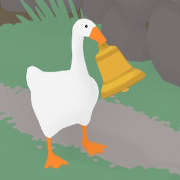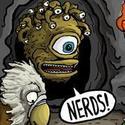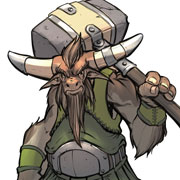|
TG has a variety of threads on various aspects of game design and gamemastering, but so far little to nothing on the art of adventure design. For clarity, I consider an "adventure" to be:
I've got some ideas on an abandoned dwarven fortress I want to write up into a Torchbearer module. I'm sure some of you have similar ideas. Let's talk about them, and figure out how to make our ideas better. Resources
As you provide more resources in this thread, I'll edit them in. inklesspen fucked around with this message at 19:17 on Aug 7, 2014 |
|
|
|

|
| # ? Apr 28, 2024 07:41 |
|
Saved for OP if needed.
|
|
|
|
I'm working on an adventure for Torchbearer. The basic concept is there's a dwarven stronghold that was abandoned after a cataclysmic war. Over the years, some people have found their way inside and returned home laden with gold, but it's well hidden and populated by monsters. Dwarven automatons patrol the ruined corridors, enforcing the security of a state that no longer exists. Some passages have caved in and other new ones have been added by more recent inhabitants. The inspiration is less Moria and more the Dwemer ruins in Skyrim. Ambitious adventurers could bring in colonists to help rebuild civilization, which would eventually lead to diplomatic troubles with the dwarven lords. I mapped out the lowest-level areas and ran it for my first Torchbearer game. A lot went wrong, but I had fun and I'm going to keep working on this. My first priority right now is laying out the city as it was inhabited, and then figuring out what's happened to it over the centuries since.
|
|
|
|
Cool, just the thread that I needed. I've been brainstorming an adventure that takes place in a dream-like environment. Potentially just a weird dimension of dreams, potentially actually taking place in a dream shared by the player characters where they must defeat a big bad, or maybe just as a diversion during an adventure where there are monsters about that might attack the characters in their dreams. Thus far I haven't got anything concrete written down, but I've been thinking of ways to give the scenario a dream-like quality.
That's all I've got thus far. Input would be appreciated.
|
|
|
|
For all that our dreams are wacky places with little coherent logic, people expect that dreams in fiction be related to the plot and somewhat coherent. I'd recommend sticking to a rule that there needs to be one sort of continuity when switching scenes; if there's a discontinuity in environment, mood should be preserved, say. Another interesting thing is that a lot of fiction has a risk of being stuck in the dream. Inception, particularly, but I'm also reminded of the dream monsters from The Wee Free Men (Discworld) where eating or drinking inside the dream trapped you there (just like Fairyland, actually).
|
|
|
|
inklesspen posted:For all that our dreams are wacky places with little coherent logic, people expect that dreams in fiction be related to the plot and somewhat coherent. Yeah, you're right, the dream scenario should still have an internal consistency to it, so even if the scenes and places will vary wildly there will still be a coherent explanation behind the scenes as far as what is keeping the characters stuck on the dream and what its motives are. The angle I'm probably going for is that there is some malevolent force that has gotten the characters into a shared dream. Getting killed in the dream will probably lead to the aforementioned getting stuck, but there might yet be a way to save someone that does in the dreamworld. So, the dream is the scenario itself, getting out of the dream without getting stuck in it will be the focus of the scenario.
|
|
|
|
I just added two articles on writing Dungeon World adventures to the op: Johnstone Metzgers and Joe Banner.
|
|
|
|
Ratpick, you should take a look at Lacuna, in which all player-facing information has subtle surrealistic qualities but only the GM stuff straight-up calls it a dream setting.
|
|
|
|
So... pacing. I am running up into a wall that is driving me crazy - for the life of me I cannot pace a game to save my life. Games I write as oneshots turn into 5-6 session campaigns. The campaign I started has been plagued with long breaks, and in the 4 months and 4 sessions of play (roughly 9-11 hours) since we've started they have yet to move past the same in-game day in a section of an adventure I thought would take a maximum of two hours. One of the above sessions was a blast, apart from folks showing up late and thus forcing me to retcon what was happening twice in short order - the players engaged, they came up with a fun plan, and things were actually accomplished. The most recent session did not go well. Literally nothing of note happened for the campaign, despite knowing that moving a story forward is preferable to stupid foreshadowing I wasted about 45 minutes of play on something that won't come into play for literally months (in-game and out) of play. HELP. How do I plan manageable adventures? How the flying gently caress do you run a oneshot in something that's not Call of Cthulhu / Big Motherfucking Crab Truckers?
|
|
|
|
Your question might be better asked in the GM Advice thread; this thread is about writing adventures for other groups to run. That said, a good GM will try to engage with what the group is trying to do. But sometimes what the group is trying to do is stupid. So if the group is investigating the red-herring rumors of werewolves instead of hunting down the vampire lord, go ahead and change your plans to have the Cult of the Silver Moon as a big bad. But if your group is going door to door looking for the most cost-efficient inn to stay in, just tell them to knock that poo poo off. Pelgrane's Cthulhu adventures also have the idea of "the Card". When the players have found all the clues/plot to be found in a specific locale, the Keeper holds up a card. This lets the players know they got everything, and they can do some roleplay with the NPCs or just move on. And if it turns out your group just likes spending all their time chatting with NPCs about things of no consequence, well, that's something you'll need to work out with them.
|
|
|
|
One thing I don't see often enough in D&D adventures is an explicit ticking clock. This generally applies to anything that has per-day resources that need to be managed. This is particularly true in something like a dungeon crawl where the PCs are launching some kind of proactive assault and the NPCs are playing defense. The ability to fall back to a secure position and rest is a HUGE advantage, and games with per-day resources were usually designed that this is the exception, not the rule. Going nova in the first fight should leave the party at a very significant disadvantage; not because of some antagonist GM/player relationship but because that's how the system was designed and balanced in the first place, and will massively favor PCs that have limited recharge powers. Even outside the context of number of fireballs per day, this has relevance because the overall power level of the PCs is almost always magnified when they have time to burn. When given infinite time to do additional prep and legwork, option paralysis can quickly set in and suddenly there are twelve additional things the party wants to do to amass a series of small advantages to go smash against the major objective. While there is nothing wrong with this in the abstract, most of the times this happens in adventures where sidestepping the dungeon entirely was not the idea, and the system you're running may not be designed to do this in a way that is fun or exciting. Hint: most aren't. After every encounter, it's worth considering what is pressing the PCs to keep advancing RIGHT NOW. Or perhaps more accurately, what are the disincentives to heading back to a safe position and doing whatever is the equivalent of Healing To Full? If none, it is almost guaranteed that the PCs will do that. Meaning every encounter needs to be calibrated against a full nova party, which may or may not be the way you want to go.
|
|
|
|
inklesspen posted:Your question might be better asked in the GM Advice thread; this thread is about writing adventures for other groups to run. Nope, my question is specifically as pertains to writing adventures, specifically writing an adventure to be run within a certain period of time. When I get home tonight I'll see if I can't link the adventure I've written for reference. My most recent session is a perfect example. I wrote an adventure for FATE Accelerated, came up with four pregens with various degrees of completeness as one of the selling points of FATE is being able to add in detail to characters on the fly, and started running after explaining the game mechanics. In the two or so hours we played, the players only managed to interact with one NPC and got through exactly one encounter, a 'combat' against a possessed library maze. The majority of the session was spent in combat against the library. FATE Accelerated is billed as a fast-running system, I can certainly understand intellectually how it speeds things up, and I'm familiar with game recaps and actual plays of similarly-styled games and systems. My problem is that no matter how I believe I'm simplifying my design and writing, no matter the more simple systems I move to game in, and no matter how I analyze my past work I cannot for the life of me write a oneshot.  I've run three oneshots as a GM, only one of which I wrote. Two were Call of Cthulhu adventures where the entire game could be summed up as 'bad poo poo is in [place]; characters enter [place]; bad poo poo happens; survivor(s)/no one leave(s)'. One was a Big Motherfucking Crab Truckers game where all I wrote were three short groups of bad guys to harry the Crab Truckers, it's such a simple system it really doesn't have any mechanics for failure. What are some tips for adventure design when you're aiming to write a convention scenario or one-night 3 hour pickup game? Because I have written a half-dozen attempts and they've all either crashed and burned or taken months to complete, and it is really starting to bug me that I can't fix it.
|
|
|
|
SageNytell posted:In the two or so hours we played, the players only managed to interact with one NPC and got through exactly one encounter, a 'combat' against a possessed library maze. The majority of the session was spent in combat against the library. That's about right for two hours of play. Combats take a long time, even more so in a con or one-shot condition where the players are not familiar with each other or the system. In a con game which is intended for system novices, the most I would ever build would be two combats - one extremely simple one just to teach the basics, and a second fight which throws a single intermediate-advanced wrench into the works. There is a reason that the structure for the D&D 4E stuff intended for pick-up play is either three fights with almost nothing inbetween (dungeon delves) or one complicated fight with more setup beforehand (lair assault). In the context of a game where combat is mechanically complex, fighting just takes a long time period. The only way to really speed that up is for the person running the game to be prepped to the gills (can set up the entire combat space in 3-5 minutes) and/or the players to be intimately familiar with the system so the first round doesn't consist of everyone staring at their character sheets and not knowing what to do. As the adventure author, all you can really do is call those factors out in the text and explicitly say that if you don't do these things, you will most likely run 1-2 hours over the projected length of the game.
|
|
|
|
I added on a little "adventure overview" section at the start of my 13th Age one: http://goo.gl/6xhglx For the pacing discussion, I figure the full-course version of this adventure would take two sessions with a familiar group who all knew their characters. Town intro + first two combats in one session, and moving at a good clip they could probably clear the last three in one go with a bit of time for denouement, maybe spend a little bit of time in the next session hanging around the town extorting favors and looking for the next hook. With unfamiliar newbies it'd probably go intro+1 combat/2 combats/last 2 combats. If I was dead set on compressing the whole thing into a one-shot, I'd scratch one of the first combats entirely and give out the information they would've gotten from the other in a skill check/montage type thing, scratch the middle fight between the dungeon entrance and boss, and maybe jack up the difficulty of the final fight to account for the resources the players haven't lost. For one-shots I have run, you have to be willing to railroad a bit. If the PCs are wandering about, the adventure needs to come find them and drag them away kicking and screaming. Start with the PCs having off-screen agreed to do the thing the session is about and have the first scene begin right after they've embarked upon it. If something NEEDS to be one session and you're halfway through time-wise but nowhere near the end, scrap the plans and cobble something that can work as a conclusion out of the remains. Instead of actually RPing out the meeting of the characters you should do something else. Dungeon World's History or the montages from the 13th Age Organized Play or Tenra Bansho Zero's Emotion Matrix or Fate's collaborative aspects or something fast which can instantly tie the party together in some way. You can also just declare "you've all been hired by Quest Giver and your trials on the road here have bound you together in tolerance and respect". Goals in one-shot games need to be concrete and attainable. In one of my one-shots, the party's job was to safeguard a wedding by ensuring that the bride and groom were both alive and at the altar at sundown. I had a bunch of threats that I strung together based on what the party did, tried to make sure they increased in severity as the game went on so that any one could serve as a suitable finale, and as a group we fiat declared that the last threat before the time when people needed to leave was the final one.
|
|
|
|
|
Mimir posted:Ratpick, you should take a look at Lacuna, in which all player-facing information has subtle surrealistic qualities but only the GM stuff straight-up calls it a dream setting. Thanks, I'll take a look at it! I've been getting a lot of ideas for really surreal and experimental RPG scenarios (experimental in the sense that they break the traditional mold of how GMs address the players and narrate things to them) and at one point or another I intend to dedicate them to paper and maybe try my hand at self-publishing them. In addition to the above dream-based scenario I've got an idea for a scenario where the PCs get trapped inside a book, which will require the GM to adopt the role of an unreliable third person narrator to relay information to the players. Once I've got something concrete written down and have playtested these scenarios a couple of times I'll link that poo poo over here.
|
|
|
|
I recently discovered the joy of roguelikes and am curious - have there been any attempts to replicate this experience on the tabletop? Are there any actually good and robust random dungeon creation systems? Most editions of D&D have shipped with a perfunctory random encounter generator and maybe a few guidelines for rolling dice about corridor length and room size, but D&D is pretty universally awful in solo play.
|
|
|
|
There was the Cardmaster Adventure Design Deck from 1993. IIRC, it could be played solo. It was bad, though.
|
|
|
|

|
| # ? Apr 28, 2024 07:41 |
|
You could try something like the D&D Adventure System tiles (the ones that come with Castle Ravenloft / Wrath of Ashardalon / Legend of Drizzt). You'd have to modify their rules a little if you wanted to use them for a campaign though, but it wouldn't be too hard.
|
|
|













